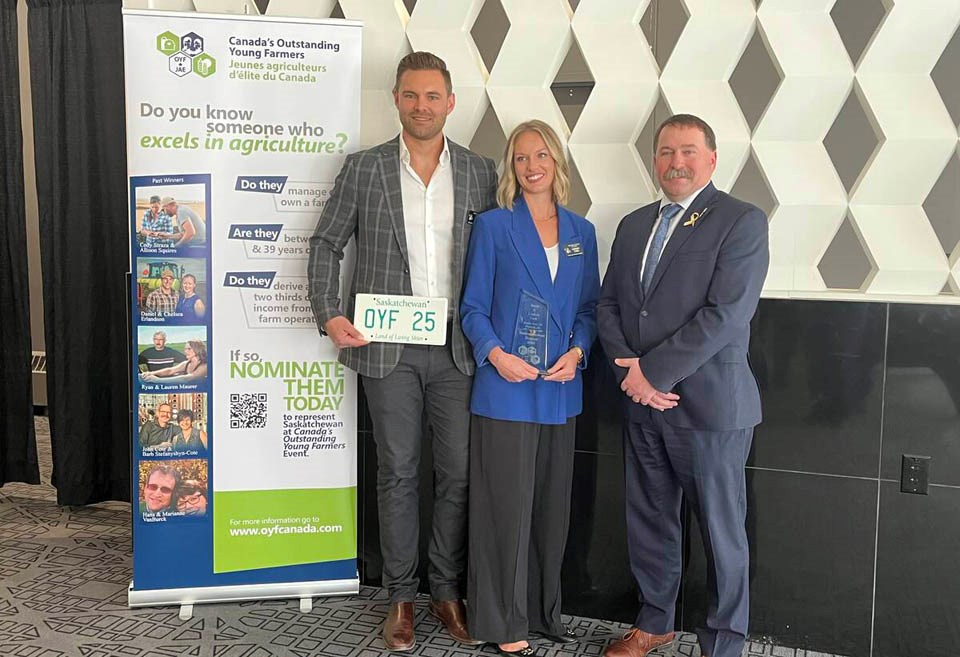REGINA — A Saskatchewan couple who established Canada’s largest subsurface drip irrigation project are the province’s nominees for Canada’s Outstanding Young Farmers program in 2025.
Brady and Lindsay Funk live at Wymark, Sask., where they farm with her father and brother. In 2015, they founded Braylin Acres and later bought land at Lucky Lake, Sask., for the irrigation venture.
The project was necessary after years of drought, Brady said. He took a Bible verse to heart and travelled to Israel to look at how irrigation is done there.“I wanted to see how the Israelis were able to use water in a super efficient fashion with the Netafim drip irrigation system that they patented,” he said.
“We took that information and developed six quarter sections at Lucky Lake.”
There is no evaporation loss because all the water is delivered directly to the root zones.
“Subsurface drip irrigation works by first of all installing essentially emitters, water lines, underneath the soil, roughly 11 inches below the top soil, and through different valves and pressure compensators and pumps, the water is delivered to the field edge and then pushed through those water lines that are below,” Brady said.
“They pulsate the water up to the root zone of the plant.”
The Funks also incorporated fertigation into their system.
“We can actually microdose nutrients to the plant throughout the growing season at every specific time that it is optimal for that plant to have the best opportunity to produce the most amount of bushels,” Brady said.
As private irrigators, they installed their own infrastructure, including one mile of three-phase power and three miles of 24-inch pipe. He said one big number is the eight million feet of subsurface drip irrigation tape the project required. They partnered with Southern Irrigation to get the work done.
The system moves up to 5,500 gallons per minute, and Brady has remote access to the entire project through radio frequency and a cell phone signal.
“So I could be in Israel and turn the pump on and monitor the pressure differential to see if we have any leaks or add nitrogen from that location,” he said.
The project has been in operation for about 18 months and the results are what the family hoped for.
They have seen 30 to 50 per cent reductions on inputs such as power, water, nitrogen and fungicides, and the yield results have been phenomenal.
Their crop yielded 500 per cent more than the dryland acres across the road last year.
“The durum that we pulled off weighed up at 66 pounds per bushel, so it was just an incredible result that we were able to achieve this year,” Brady said.
Braylin Acres received a $2 million Agriculture Clean Technology grant from the federal government for the adoption of technology that contributes to sustainability. That announcement came in late February.
This year, the family intends to plant Blackstrap black beans on the project land and are going to plant one acre of vegetables for research and development purposes. Their goal is to produce vegetables for Saskatchewan consumers.
Lindsay, who works as a registered nurse in inpatient mental health, also runs a flower-farming business with her sister-in-law. She said another important goal is to build a foundation for future generations. Their children are eight, six and four.
“Family farms in Canada are steadily decreasing while large corporations are growing. Land and technology are expensive and the weather is unpredictable,” she said.
“Sustainable farming practices allow for the longevity of the land, higher profit through the irrigation and a greater chance for our children to choose to continue to farm.”
Two other couples were also nominated this year. Steven and Danielle Malo of Wolseley have grain and bison operations. Marc and Cheryl Norleen from Raymore grow conventional and organic grain, have 45 cow/calf pairs and run an 8,000-hen organic poultry operation.
The national winners will be named in Toronto in November.
Contact [email protected]
About the author
Related Coverage
Economics called important part of sustainability
Loss of glyphosate remains concern for farmers
Canadian Beef Advisors unveil five-year national strategy
Sask. farm first in line for Regenified certification
Environmental focus hurt committee: member
Tips to help farmers keep their spray application on target




